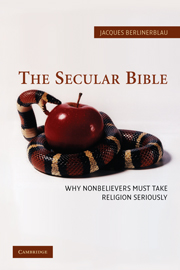Book contents
- Frontmatter
- Contents
- Preface and Acknowledgments
- Introduction: Secularists and the Not Godless World
- PART ONE THE COMPOSITION OF THE HEBREW BIBLE
- PART TWO THE INTERPRETERS OF THE HEBREW BIBLE
- 4 Why Is There So Much Biblical Interpretation?
- 5 Introducing Biblical Scholars and Secular Hermeneutics
- PART THREE POLITICS AND SCRIPTURE
- Conclusion: Beyond Church and State: New Directions for Secularism
- Notes
- Index of Biblical Citations
- Index of Qur'ānic Citations
- Index of Rabbinic, Early Jewish, and Patristic Citations
- Index
5 - Introducing Biblical Scholars and Secular Hermeneutics
Published online by Cambridge University Press: 05 June 2012
- Frontmatter
- Contents
- Preface and Acknowledgments
- Introduction: Secularists and the Not Godless World
- PART ONE THE COMPOSITION OF THE HEBREW BIBLE
- PART TWO THE INTERPRETERS OF THE HEBREW BIBLE
- 4 Why Is There So Much Biblical Interpretation?
- 5 Introducing Biblical Scholars and Secular Hermeneutics
- PART THREE POLITICS AND SCRIPTURE
- Conclusion: Beyond Church and State: New Directions for Secularism
- Notes
- Index of Biblical Citations
- Index of Qur'ānic Citations
- Index of Rabbinic, Early Jewish, and Patristic Citations
- Index
Summary
These are people whose early lives were dominated by an intense religious commitment, in many cases fundamentalism, but whose adulthood is marked by quiet acculturation to the secularism of the academic world and often by a slow but steady dissatisfaction from all religious institutions. Among biblical scholars, even some of the most outspoken and effective debunkers of traditional views are — though you would never guess it — ex-clerics or graduates of theology departments.
Jon Levenson, “Theological Consensus or Historicist Evasion? Jews and Christians in Biblical Studies.”Here in the ghetto of Biblical Studies, we are still working with a mental image of text as a word-search puzzle that can be ringed and solved, or as a box stacked with precious things, all co-ordinated by an author who imitates the foreplanning and prescience of (the secure and protecting kind of) God.
Yvonne Sherwood. A Biblical Text and its Afterlives: The Survival of Jonah in Western CultureProfessing at a college or seminary near you — in almost complete obscurity — are individuals commonly known as “biblical scholars.” The reasons for their marginality in the academy and elsewhere are complex and rarely discussed. Let's just begin by saying that in the aggressively, even obnoxiously, secular milieu of American higher education, biblical scholars are different. Amidst legions of grinningly irreligious and areligious faculty, Old and New Testament researchers typically maintain (or once maintained) a pronounced faith commitment.
- Type
- Chapter
- Information
- The Secular BibleWhy Nonbelievers Must Take Religion Seriously, pp. 70 - 84Publisher: Cambridge University PressPrint publication year: 2005



